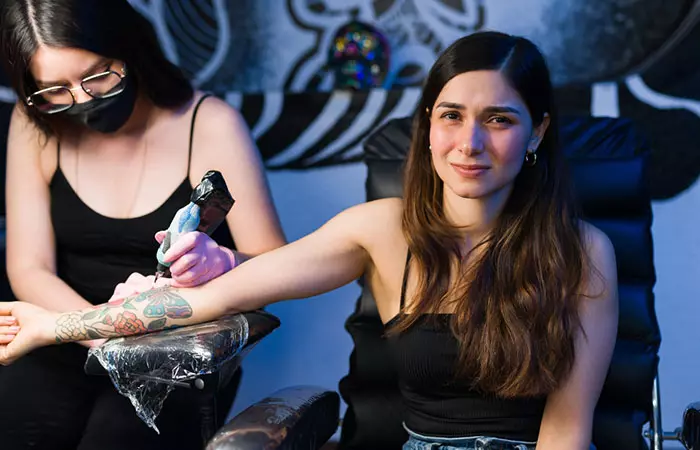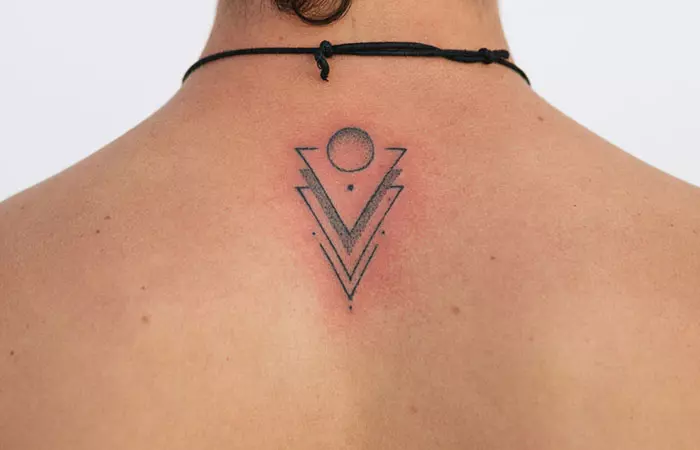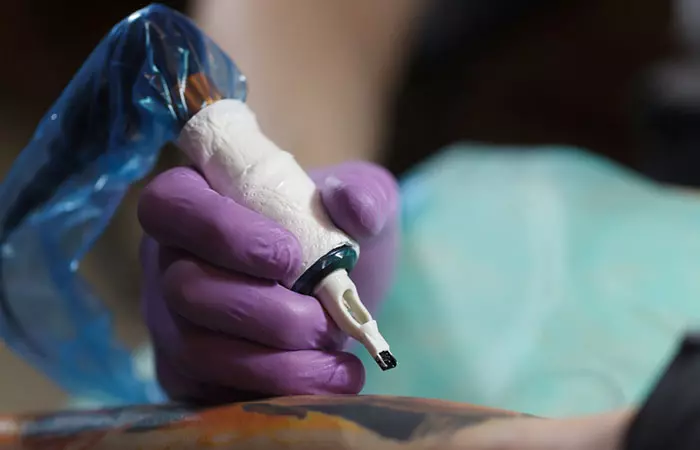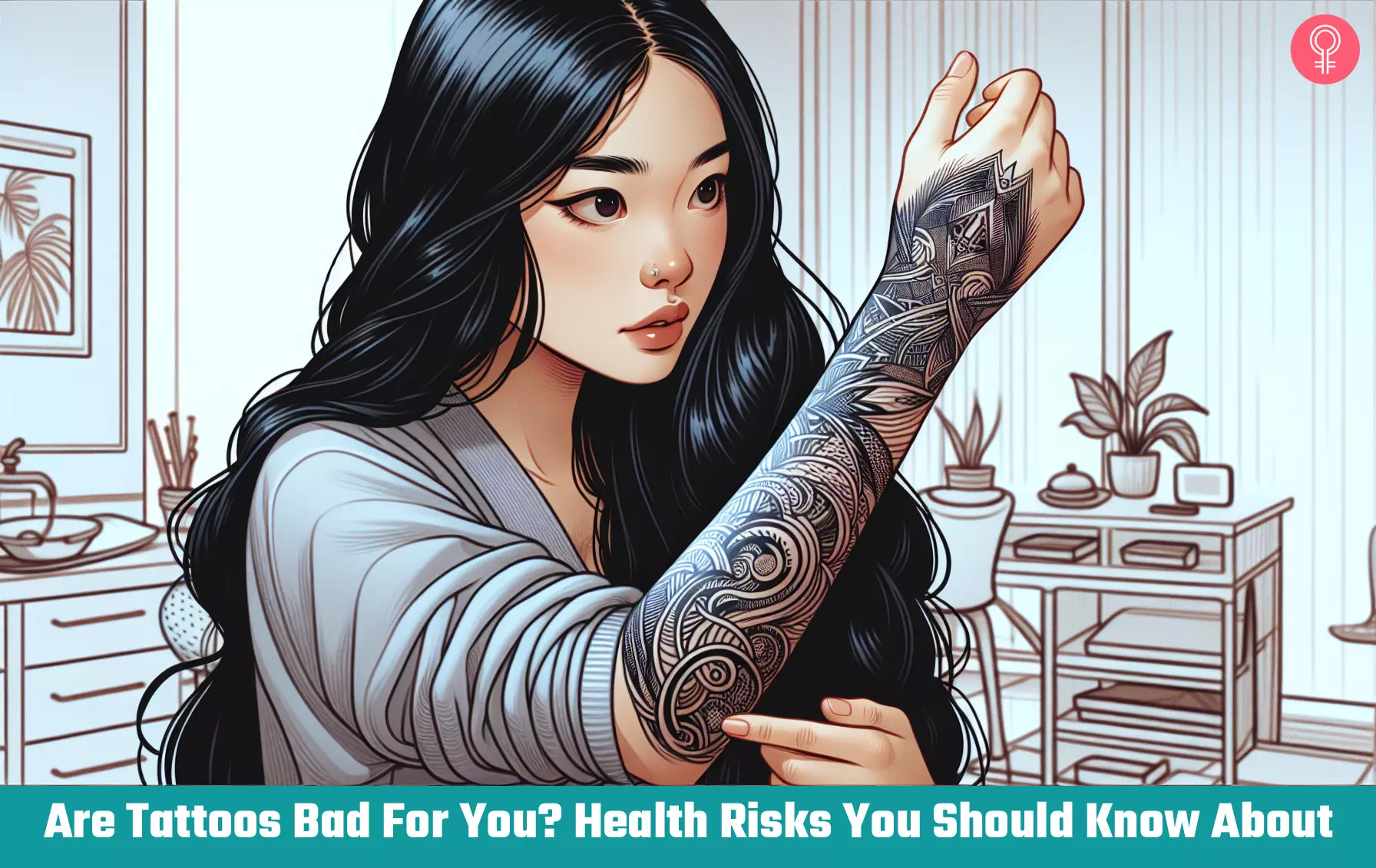
If you’ve ever toyed with the idea of getting a tattoo, you’ve probably wondered, “Are tattoos bad for you?” While body art is a curiosity, there are also some potential health risks associated with getting a tattoo. With tattoos becoming increasingly popular, it’s only natural to think about the impact they can have on your well-being. In this article, we’ll dive into the potential health risks associated with tattoos and highlight factors that people should be aware of before getting a tattoo. Understanding the potential downsides is crucial for those considering adorning their bodies with permanent art, as it allows for an informed decision-making process. Let’s unravel the various aspects surrounding the topic in the following sections.
Are tattoos bad for you?
 Image: Shutterstock
Image: Shutterstock
Although tattoos are generally safe, there are some risks. Infections can occur if proper hygiene is not maintained during tattooing. Allergic reactions to ink components are also possible. In addition, tattoos can cause skin irritation or scarring. Good aftercare, working with a reputable tattoo artist, and maintaining a sterile environment can minimize the risks mentioned above. It is advisable to consult professionals and follow care instructions to safely enjoy the experience of getting body art.

Do not get tattoos over moles or birthmarks, as this can obscure changes in their features, such as changes in size, color, shape, or texture, which could indicate underlying skin conditions.
While we know that there are certain risks associated with getting a tattoo, are there also potential life-threatening health risks? The following section addresses this question.
Can tattoos cause cancer?
 Image: Shutterstock
Image: Shutterstock
Although researchers have investigated the possible link between tattooing and cancer over time, there is currently no substantiated correlation between the two. The idea of a direct link is often considered a fallacy. There is no conclusive evidence to support the idea that getting a tattoo leads to the development of skin cancer (1). Some researchers have instead suggested that any observed link between the two could be coincidental (2), (3).
You may be relieved about the cancer risk, but you may still want to know if there are any other health risks associated with tattoos. Scroll down to find out.
Are there any other health risks associated with tattoos?
 Image: Shutterstock
Image: Shutterstock
1. Allergic reactions
Consider your skin’s sensitivity to perfumes, makeup, or lotions before getting a tattoo, as allergic reactions to tattoo paint are common. Despite myths about harmless tattoo inks, reactions to tattoo pigments are usually due to chemicals present in them that can irritate sensitive skin types. If you have a history of allergies, consult an allergist before getting a tattoo. Be vigilant for skin reactions during or after tattooing, ranging from irritation to severe reactions such as swelling or blistering. Seek medical attention if you experience any adverse reactions to ink.
Tanisha Aggarwal, a YouTuber, shared an unexpected tattoo experience that turned into a nightmare for her: “On the third day, the blisters had gotten worse, they had spread all over my tattoo and it had turned into a scab. On the fourth day, I saw pus coming out of it and it was so bad that I panicked again (i).” The tattoo artist’s aftercare instructions made the condition worse and she eventually had to seek medical help.
2. MRI complications
Tattoo pigments containing metallic salts or substances, including heavy metals, can complicate MRI scans and cause discomfort, heating, and image artifacts. Inform healthcare providers about tattoos prior to an MRI to assess risks. If you have a medical condition that requires frequent MRIs, consider delaying tattooing, as complications such as inflammation that “may feel like a burning sensation” have been reported (4). Magnetic resonance reactions in tattooed areas during MRI are uncommon but can occur. It is important to take precautions and communicate transparently with healthcare providers to ensure a safe exam.
3. Hepatitis
Getting a tattoo carries a significant risk of blood-borne diseases, particularly hepatitis B and C viruses, which can be transmitted through shared tattoo needles (5). Therefore, it is essential to thoroughly research your chosen tattoo parlor before undergoing the procedure. It is crucial to visit the parlor multiple times to ensure that staff consistently wear gloves and use fresh, clean needles for each client. Strict sterilization practices in tattoo parlors are essential to reduce the risk of infection.
4. Scars
Tattoos can cause scarring if the skin is excessively traumatized during tattooing or if proper aftercare is not provided. Poor healing practices such as picking at scabs or exposure to irritants can also contribute to scarring. Although scarring of tattooed skin is a natural part of the healing process, individuals should follow recommended aftercare procedures to minimize the risk of excessive or unwanted scarring.
Armed with all this knowledge, you are now better equipped to deal with almost all of the potential health risks that come with tattooing. But you may still be wondering if pen ink has any adverse effects on your skin. Find out the answer to that in the next section.
Is pen ink bad for your skin?
 Image: Shutterstock
Image: Shutterstock
Pen ink may contain harmful pigment particles, allergens and can lead to skin irritation or allergic reactions. In addition, various ink particles may contain harmful substances such as alcohol, barium, cadmium, copper, lead, mercury, minerals, nickel, plastics and vegetable dyes. In addition, improper sterilization practices can increase the risk of infection. It is vital to use reliable and sterile ink, follow proper hygiene and consult professionals to minimize health problems. Communicating with the tattoo artist about possible allergens in the tattoo ink can help address individual sensitivities and reduce the risk of adverse reactions.

Ask your tattoo artist about the ingredients in tattoo ink and request the Material Safety Data Sheet (MSDS) to check for potential allergens. The MSDS provides information about the chemical properties of a product, including hazardous ingredients.
Additionally, different colors in tattoo inks are created by mixing different pigments, and some of these may contain substances that have been linked to cancer. For example, black tattoo inks containing carbon black may have a higher risk of being associated with cancer. One study found that polycyclic aromatic hydrocarbons (PAHs), a class of carcinogens, were present in most tattoo inks (6).
Research has also investigated the association between ultraviolet radiation (UVR), red tattoos, and skin cancer in mice using a red tattoo ink containing a banned carcinogen. Under UVR exposure, mice with red tattoos showed slightly accelerated third tumor onset and faster growth rates for second and third tumors compared to controls. The observed co-carcinogenic effect was considered weak and possibly not clinically significant (7). However, further human studies in this regard are needed.
Although tattoos are generally safe, there are some potential risks associated with them, such as infections, allergic reactions, and skin complications. It is important to note that there is no direct link between tattoos and cancer. In general, it is important to exercise caution before getting a tattoo. The choice of ink plays a crucial role, as substances in tattoo pigments can have some adverse effects on the skin and overall health. Proper aftercare and choosing reputable tattoo artists allows people to enjoy body art while minimizing potential health problems.
Frequently Asked Questions
Are tattoos bad for your immune system?
Tattoos, when applied in sterile conditions, generally do not harm the immune system. However, the body’s immune response can be activated during the tattoo healing process.
Are Henna Tattoos Bad For You?
Henna tattoos are generally safe, but serious reactions can occur. Make sure you use pure henna and be careful with additives that can cause skin diseases or reactions. Temporary inks made from natural ingredients can also predispose you to specific reactions to nuts, fruits, or vegetables that you are prone to. It is best to consult a professional esthetician before committing to any product.
Who is not allowed to get a tattoo?
People with certain skin conditions, allergies, or medical conditions should avoid tattoos. Pregnant individuals are advised to consult their health care provider before getting a tattoo.
Do tattoos cause long-term damage?
Tattoos generally do not cause long-term effects, but reactions to tattoo ink can vary. Improper aftercare or allergic skin reactions can lead to complications. It is essential to follow aftercare instructions and choose reputable tattoo artists.
What percentage of tattoos become infected?
The infection rate for tattoos is relatively low. One study estimated it at around 0.5% to 6% in 67 cases between 1984 and 2015 (8). Good aftercare and hygiene significantly reduce the risk of skin infection.
Key Points
Tattoos are generally safe, but infections, rare allergies, and skin problems can occur without proper hygiene and aftercare. It is recommended to work with a reputable artist to ensure this. There is no substantiated correlation between tattoos and signs of skin cancer; any suggested link is considered coincidental by researchers. Tattoos can carry additional health risks, including allergic reactions, MRI complications, hepatitis, and scarring. Pen ink may contain allergens and carry the risk of skin irritation.
Image: Dall·E/StyleCraze Design Team
This YouTube video explores the dangers of tattoos from a doctor’s perspective and sheds light on potential health issues that come with them. Ready to make informed choices? Watch it now to prioritize your well-being as a tattoo enthusiast!
Personal experience: Source
StyleCraze’s articles are interwoven with authentic personal stories that add depth and resonance to our content. Below are the sources of the personal accounts referenced in this article.
(i). My Worst Tattoo Experience | Tanisha Aggarwalhttps://www.youtube.com/watch?v=GVhdhRBvJUoWas this article helpful? ![]()
Leave a Reply